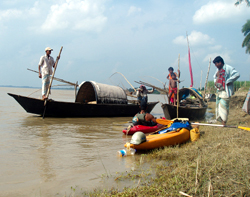|
|
| BOAT BROTHERS: Curious locals watch the two kayaks somewhere along the Ganga |
Ram Silwal and Endra Rai's journey might have taken less than three weeks, but it was the essence of classic, epic adventure travel. The two professional river guides kayaked 1,300km from the foothills of the Nepal Himalaya down to the Bay of Bengal. Along the way, they say they experienced the best and worst of unconventional travel in South Asia, from kayaking on the Ganga with fresh water dolphins for company, to spending 36 hours in Indian police custody.
Silwal and Rai made the trip to encourage Nepali youth to take up adventure sports, create awareness about Nepal in neighbouring countries, and encourage environmental and river protection.
On 22 August, the duo mountain biked for two days from Pashupati to the Tala Marang creek in Helambu. There, they got in their kayaks and floated down to the Melamchi, which later joins the Indrawati. This was the first kayak descent ever made on the stretch. They continued through challenging white waters of the Sun Koshi and Sapta Koshi, reaching the Indian border five days later where they walked across the Kosi barrage into India.
"We were expecting big whirlpools where the Kosi meets the Ganga, but conditions were surprisingly different," says Silwal. It took a while for Rai and Silwal, more familiar with rapid white waters, to get used to the massive stretch of rivers in the flatlands. "Fortunately, we didn't have to confront any crocodiles but did see over 50 freshwater dolphins," adds Silwal.
The duo settled into a routine that seemed natural after just a couple of days. Setting out early each morning, they would paddle hard until noon. By late afternoon, the search for the night's campsite would begin. Sometimes they'd camp too close to villages and be surrounded by crowds of over-friendly villagers, while at others they moved after locals warned them of dacoits and wild animals. They even passed an occasional night in their kayaks when the banks of the flooded Ganges were too marshy to set camp.
However, as they neared the sensitive India-Bangladesh border in West Bengal's Lalgola area, neither expected the welcome they got. "At first it seemed like people were cheering us on as we paddled down the middle of the river. We didn't realise we were in trouble until a motorboat carrying Indian Border Security Force (BSF) soldiers in plain clothes came right up to us," they recall.
Although they had a legal visa for Bangladesh and didn't need one for India, they were handcuffed and locked up for almost 36 hours until the BSF finally decided the two were harmless and let them go. However, a portion of the film they had shot on the Indian leg of the journey was erased by the security forces. There was nothing they could do but make up for the lost time and so they did.
On 5 September they crossed into Bangladesh where the Ganga changed to the Paddha.

On the morning of 11 September they sensed the sea air. Paddling hard for almost 12 hours, they reached the Bay of Bengal by evening. From the moment they got into the water in Tala Marang, they had paddled a total of 153 hours, 29 minutes, and 35 seconds, and were the first ever to make the epic journey.
Along the way there were plenty of lessons. "The single most important thing we learnt was that if there is anything dangerous to man, it is perhaps man himself. In India and Bangladesh people depend on the river for their livelihood and if we here at the source do not keep the rivers clean, people there will suffer," says Rai, who is also the goodwill ambassador of the Nepal River Conservation Trust.
The trip was a dream come true for the duo. Silwal had been planning the expedition from the 'source to the sea' for two years and realised Rai was the perfect partner when they met six months ago. "We were inspired by Edmund Hillary. Even after being the first to summit Mt Everest, he didn't rest and went on other equally exciting and adventurous journeys," says Rai, who is also the first from the Rai community to summit Everest.
The two spent almost $1,500 of their own money on the trip. Logistical support came from Nepal Mountain Bikes, camping and kitchen equipment from Himalayan Ecstasy, kayaks from The Royal Beach, and clothing from Kavu. Silwal and Rai now plan awareness campaigns to educate and inspire the younger generation to take more interest in adventure sports. "There is so much potential for adventure sports that young people need not go abroad for jobs," says Silwal.



